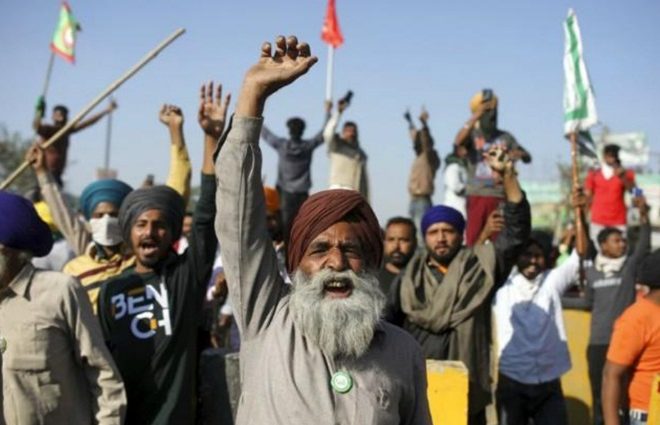Failing crops, and falling prices when the produce has been abundant, are a recurrence beyond differentiation in the agriculture sector of India. The two factors have a direct bearing on the predicament of farmers. With an atmosphere of unpredictability looming large, it is not surprising that the rate of suicide is exceptionally high in this sector, even though India has an agrarian economy. Farmer suicides account for 11.2 percent of the total suicide cases in India, which is a sign of deep rooted problems associated with the sector. Farmers are often pushed to take such a drastic step when living under the vicious constriction of debt, uncertainty, and poverty becomes insurmountable.
The Indian farmers are by and large poor and dissatisfied with negligible improvement in their economic condition while new policies are formulated and power changes hands. In 2016 a comprehensive report was published by the Niti Aayog titled as ‘Evaluation Report on the Efficacy of Minimum Support Prices (MSP) on Farmers’, which delved with various aspects of MSP and how it can be made more effective.
There are very interesting findings of the report, particularly relevant, in context of the Farm Bill 2020 that were recently introduced by the central government and approved by the parliament and the President of India. The first paragraph of the Niti Aayog report defines the role of MSP and states, ‘The idea behind MSP is to give guaranteed price and assured market to the farmers and protect them from the price fluctuations and market imperfections…with the globalization resulting in freer trade in agricultural commodities, it is very important to protect the farmers and their interest.” It needs to be noted that subverting the role of MSP is one of the pertinent points of conflict between the three farm laws, and the protesting farmers. Certainly, the government has its explanation backing its new stand of loosening its control over the sale of agricultural products by calling the reform as a ‘watershed moment’ for Indian agriculture.
Minimum Support Prices have been essentially applicable on 22 crops and there have been large scale discontent among farmers, not because the policy is ineffective but how it has been rendered insignificant through its application. A case in point is the awareness among farmers of MSP before sowing a crop. Statistics were significantly different when it came to the percentage of farmers knowing the rate fixed by the government before sowing the crop (10%) as compared to the awareness post sowing (62%). Certainly, the conduct of governing bodies that have the role to inform the farmers of the available price is questionable.
The Niti Aayog report also underlined the negligence in MSP implementation where farmers complained about the delay in payment, the unavailability of Mandis nearby, and the corruption at various levels in procuring the benefits. Yet, the farmers throughout the country felt MSP was essential to the sector, which at the least helped them to strike a better deal with private buyers with it serving as the base price. A major chunk of 67% farmers sold their produce at MSP and 94% of them desired that the MSP should continue. With the statistics heavily in favor of making MSP more effective, it is puzzling to understand why the CEO Niti Aayog, Amitabh Kant is batting in favor of the current farm reforms, which are largely diluting the role of MSP and encouraging private players to become the determinants.
The Essential Commodities Act 2020 (under the Farm Act ) that brought sweeping changes to delist crops like cereals, pulses, onions, potatoes, oil seeds from essential commodities with no government regulation over their stockpiling by processors and supply chain owners, leaves small farmers at the mercy of market manipulations by big traders. With no MSP blanket to cover their minimal interest, the stakes to survive will be high for the marginalized small holding farmers.
Currently, various government agencies procure food grains from the farmers at MSP for the public distribution system (PDS). With the government deregulating food hoarding, there are likely chances that the ability of the government agencies including the Food Corporation of India (FCI) to procure food grains for PDS will also be adversely hit. The Global Hunger Index 2020 ranks India at 94th position, among 107 countries, much behind Bangladesh, Pakistan, and Nepal, and with more uncertainties to the public distribution system that guarantees to put some food on the plate of the hungry, the future is anything but promising.
With thousands of farmers protesting against the Farms Act 2020, putting their lives at stake in the chilly winter and demanding nothing less than a roll back, it is time the government heeds their desperate call to be heard. It cannot be overlooked that MSP was introduced in 1967 to encourage farmers to grow food crops that were otherwise not lucrative but essential to feed the growing population and avert famines. The Niti Aayog’s comprehensive report of 2016, on the efficacy of MSP clearly states that 94% farmers wanted it to be implemented effectively.
Undoubtedly, the agriculture sector of India is ailing and requires reforms that are beneficial for the growers. But if the farmers are not convinced with the reforms, the question looms large of who happens to be the actual beneficiary of such a reform?

